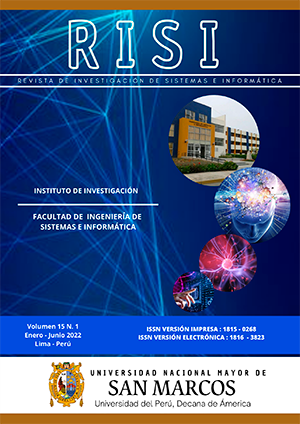Application of the Data Science methodology to analyze electricity billing data. Case study: Uruguay 2000-2022
DOI:
https://doi.org/10.15381/risi.v15i1.23544Keywords:
Principal Components Analysis, Exploratory Data Analysis, K-Means Algorithm, K-NN Algorithm, Machine Learning, Linear RegressionAbstract
The objective of this research is to analyze the electricity billing data in Uruguay during the period 2000-2022, using machine learning algorithms. It is a descriptive-explanatory type of research, and the Data Science methodology is used to achieve the stated objective. The K-Means algorithm is used to group the data according to the types of clients, the K-NN algorithm to generate a model that allows predicting the type of client of the new records, the PCA technique to reduce the dimensionality of the data, prior to the application of the Linear Regression algorithm to obtain a model to predict the total electric energy billed from the new records. The model obtained with K-Means generated a cluster for each type of customer, perfectly grouping the data. The model obtained through K-NN made it possible to predict whether the client was residential or non-residential, with 100% accuracy. Combining the correlation analysis with the PCA analysis, the dimensionality was reduced until only three explanatory variables were obtained. The linear regression model had a high coefficient of determination R2 of 0.981, and the residuals were normally distributed.
Downloads
Downloads
Published
Issue
Section
License
Copyright (c) 2022 César Aristóteles Yajure Ramírez

This work is licensed under a Creative Commons Attribution 4.0 International License.
AUTHORS RETAIN THEIR RIGHTS:
a. Authors retain their trade mark rights and patent, and also on any process or procedure described in the article.
b. Authors retain their right to share, copy, distribute, perform and publicly communicate their article (eg, to place their article in an institutional repository or publish it in a book), with an acknowledgment of its initial publication in the Revista de investigación de Sistemas e Informática.
c. Authors retain theirs right to make a subsequent publication of their work, to use the article or any part thereof (eg a compilation of his papers, lecture notes, thesis, or a book), always indicating its initial publication in the Revista de investigación de Sistemas e Informática (the originator of the work, journal, volume, number and date).


